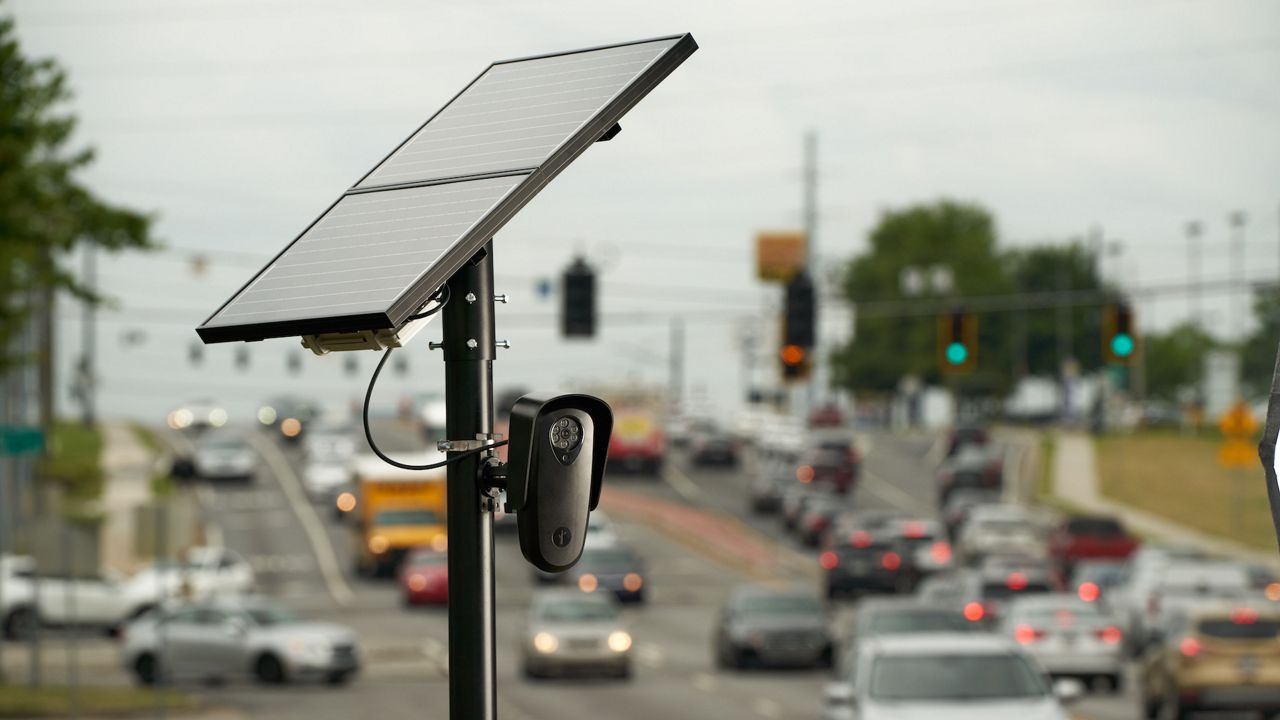LOUISVILLE, Ky. — Drivers throughout Kentucky are increasingly seeing their comings and goings chronicled as police forces and neighborhood groups install more and more surveillance cameras called automatic license plate readers, or ALPRs.
The cameras, which are typically solar powered and attached to poles, read license plate numbers and record the color, make, and model of passing vehicles by taking rapid fire photos.
The Lexington Police Department plans to install 25 of the cameras in undisclosed locations this month. Cities such as Hopkinsville and Madisonsville already have the camerasa and so does at least one Louisville neighborhood — Polo Fields in Eastern Jefferson County.
Flock Safety, the industry leader, has 34 customers across the state, 14 of which are law enforcement. A spokesperson for the company would not reveal who those customers are but said Flock Safety is “growing quickly across the state and investing resources and capital into Kentucky.”
Law enforcement officials say the cameras can be a valuable tool in investigations, providing them with more detailed information about a vehicle than eye witnesses and allowing them to track all the vehicles in an area where a crime was committed. They can also flag vehicles reported as stolen or believed to have been involved in a crime.
“It’s just like having extra eyes for criminals throughout the city,” Hopkinsville Police Chief Clayton Sumner told the City Council in January. Three months prior, the city approved spending $30,000 on the cameras.
“It is probably the best investment we’ve made with an immediate impact in a long time,” he said.
But privacy advocates have also criticized the cameras as an expansion of the surveillance state that indiscriminately track the movement of everyone, not just crime suspects.
“Enormous databases of innocent motorists’ location information are growing rapidly,” the ACLU writes on its website. “This information is often retained for years, or even indefinitely, with few or no restrictions to protect privacy rights.”
At a Lexington City Council meeting last month, Assistant Chief of the Lexington Police Department (LPD) Eric Lowe said, “The primary goals are to solve and reduce crime and to locate and recover missing and endangered people.”
LPD aims to do that with the 25 cameras it’s getting as part of a one-year pilot with Flock Safety. As part of the pilot, LPD will share data with Flock Safety and in exchange, the company is waiving the $250 installation cost and the $2,500 annual operation fee that typically comes with each camera.
Lowe wouldn’t tell members of the Lexington City Council where the cameras will be located during a meeting last month.
“We are concerned that if we were to put out a list, someone could very easily drive around Fayette County damaging those,” he said. “Also, we don’t want to send the message to anyone who might be committing crime in Lexington that here are the safe passages and not safe passages.”
Lowe said that LPD chose the locations by looking at two years of violent crime data and consulting with Flock Safety experts.
Lowe also said LPD consulted with the NAACP, ACLU of Kentucky, and Human Rights Commission as it planned to join the pilot.
“The main concern they had at that time and continue to have that’s been expressed to us, is where we place the cameras,” he said.
That’s been a longstanding issue with the deployment of ALPRs. A 2015 report on car-mounted APLRs showed the Oakland police targeted low-income areas with more people of color, rather than areas with high crime rates.
Another issue detractors have raised over the years is data retention. Lowe said LPD will erase photos after 30 days if they’re not part of an investigation. But there are no laws in Kentucky restricting how long this data can be kept. At least eight states do place limitations on the storage of ALPR-captured images, according to the National Conference of State Legislatures. At 21 days, Maine requires the quickest deletion.
In his comments to City Council, Lowe said ALPRs are soon coming to Louisville. LMPD did not respond to question about the department's plans to use the cameras.



